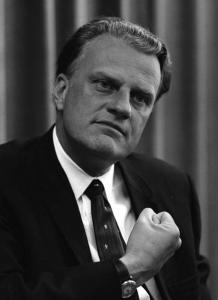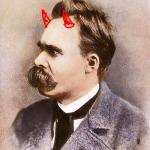Yesterday, Billy Graham finished his course on this earth full of years—ninety-nine to be exact.
Graham was a man who profoundly impacted not only this country but the world for the better part of a century. He ministered to every U.S. president from Harry Truman to Barack Obama, was instrumental in the Civil Rights movement, even posting bail for Martin Luther King Jr., and appeared on Gallup’s list of most admired men and women more often than anyone else in the world.
But of course, he’s best known for his sixty-seven years of evangelism, during which this modern prince of preachers thundered the Gospel beneath tents, in churches, and at stadiums to more people than any other Protestant minister in history: an estimated 2.2 billion.
 And following in the footsteps of Wesley, Whitfield, Spurgeon, and Moody, Graham shaped the way evangelists win souls. His rallies, which he dubbed “crusades,” popularized such beloved displays of evangelistic fervor as the altar call and the “sinner’s prayer.” And the millions who surrendered their lives to Christ at his crusades doubtless recall the contrite strains of “Just as I Am” that welcomed them to the cross.
And following in the footsteps of Wesley, Whitfield, Spurgeon, and Moody, Graham shaped the way evangelists win souls. His rallies, which he dubbed “crusades,” popularized such beloved displays of evangelistic fervor as the altar call and the “sinner’s prayer.” And the millions who surrendered their lives to Christ at his crusades doubtless recall the contrite strains of “Just as I Am” that welcomed them to the cross.
But for those of us at the Colson Center, Graham’s passing represents not just the end of an era, but something like the loss of a grandfather. Chuck Colson spoke frequently of his admiration for Reverend Graham, recalling the minister’s pastoral care and concern for President Nixon during his visits to the White House. Chuck also felt a debt of gratitude to Graham for the counsel and support he offered him upon his release from prison, and credited his mentor with shaping his ministry to the incarcerated right from the beginning.
Sitting cross-legged on the floor with inmates alongside Chuck, Graham poured out Christ’s love and shared the Gospel with lost souls behind bars exactly as he had in the halls of Washington and in packed stadiums around the world.
“He was as comfortable in that prison as he was in a palace,” wrote Chuck.
One of Graham’s defining attributes was his refusal to dilute or compromise the Gospel. Right up to his last message, “My Hope America,” he never shied from preaching the brokenness of our sinful hearts, or from beckoning us to repentance. But he did so with a winsomeness and love which earned him almost universal admiration—from both liberals and conservatives, believers and non-believers alike.
Standing at the end of his monumental life, it’s easy to chalk these ninety-nine years up to extraordinary talent. But what strikes me is how unlikely a candidate Billy Graham was to become—well—Billy Graham.
Upon enrolling in a Christian college in 1936, he reportedly found himself ill-suited and disinterested. In fact, he was almost expelled. But as Nancy Gibbs and Richard Ostling write in TIME Magazine, the college’s president urged Graham not to throw his life away:
“You have a voice that pulls,” Bob Jones Sr. reportedly told him. “God can use that voice of yours. He can use it mightily.”
And so He did. But despite the unbelievable success of Graham’s lifelong evangelistic crusade, what shone all the brighter was his humility. As the late pastor Richard Halverson once remarked, the greatest miracle of the 20th century might be that Billy Graham remained humble. Leading countless thousands to Christ and mentoring a pantheon of presidents might have inflated most of our heads. But Graham, when asked by CNN’s Larry King in 2005 whether he felt his own importance in the world, replied “No.”
“It’s the message…” he continued. “I don’t have any talents or abilities. I was a farm boy.”
And he was right. In every way that mattered, this Christian hero came to Christ “just as he was.” He knew and taught his whole life that that’s the only way to come: “Without one plea, but that His blood was shed for me.”












